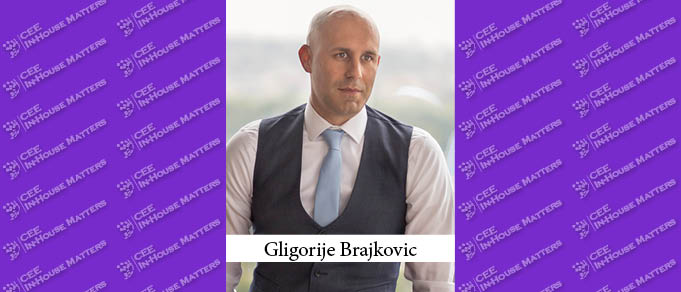Gligorije Brajkovic, Head of Legal Department at UniCredit Bank Serbia, reflects on the impact of the COVID-19 pandemic on the role of the general counsel.
A couple of years ago I wrote a short article for CEE Legal Matters related to the evolution of the general counsel role. Back then, I made some comparisons with the past and tried to predict the future, and in how the role would develop. I analyzed the speed with which our world is changing and how to adapt to those changes. When the pandemic hit the world last year, the work tempo suddenly increased like when the Millennium Falcon in Star Wars jumps to warp speed while being chased by imperial forces. Adapting to the new reality was no longer a matter of choice. We could see how important proper political leadership was on the global level, as it meant the difference between life and death for millions. Similarly, the survival of companies depended on leadership at all managerial levels. The role of a general counsel was put under the spotlight. Its main tasks were keeping the company updated with changing regulations in the new environment and communicating with regulators and the now-remote team management.
Social distancing was a big change, and it affected all of us deeply, but it also brought a million legal questions to the table. How can we sign a contract? How should we communicate with competent registers? Are we obliged by orders placed by phone? What safety measures must be implemented? How should points of direct sale operate? Can we penalize employees for not wearing a mask? Those questions required immediate answers, so every company turned to its general counsel and legal team. The change came out of nowhere, like a tsunami, and no one believed that it would last for more than a month or so. People were laughing at predictions that the pandemic would steal a year or two of our lives. Before the pandemic, it would have taken months to answer the above-mentioned questions. But now, finding answers could be critical to the survival of the business, so pondering the questions for a long time was a luxury we did not have. Needless to say, our options were to either adapt or die. So, the whole team was put on alert and directed to handle the important questions.
If you are working as a general counsel in a highly-regulated area like the financial industry, then the regulator is your primary concern. Whether you are dealing with a new product, security issues, risk parameters, financial stability, or interaction with other industry participants, obtaining clearance (whether official or unofficial) from the regulator is necessary. In the pre-pandemic era, this communication ran at a moderate pace, somehow accepted by all sides. But the pandemic made an impact: emails and formal letters with regulators were exchanged faster and the implementation of orders or agreements was immediate. General counsels were required to sign off on all of it – from simple working hours at points of sale to discussions about complex agreements with the regulators trying to preserve the financial stability of the entire market. Negotiations on such important documents were hard, especially without being able to meet in person. It was a huge personal and professional challenge.
Digitalization, which had been perceived as our future, came to us as an immediate need. It was “terra incognita” in practical and legal terms. How could we negotiate, sign documents, and – most importantly for GCs – litigate, with digital documents and in a digital world? As I said before, there was no time to contemplate risks, but only to describe them to the company and propose a less painful solution.
The cherry on top was trying to build new bridges with external lawyers. A GC needs to check whether his or her external counsel can handle all of the assigned tasks, which ones the GC must take over, and whether the partner firm can respond to new requests that your company might have.
Finally, bearing all of this in mind, a GC still has a team to lead. Team members were sent home and put in a state of urgency with new tasks that needed to be explained in online meetings. Each individual reacted differently. When you are in the office, you can predict or feel the mood, but in a digital environment, that social intelligence may be useless. Some team members may be depressed, most of them confused, and some happy to be at home with more time for themselves. Regardless, all of them have questions and concerns addressed to you, the boss. This is where your leadership skills must go one step further and hold back the tide. A tailor-made approach to each colleague is essential. In crises, a team member should feel that he is not left alone, especially at the beginning. With this understanding, we accommodated our approach to the problems or concerns of our team members. Our team had an extreme example – one of my colleagues was left stranded at an airport in the Middle East on his return trip from a vacation in Asia. With a hurt leg and no plane to take him home, he moved from one airport to another. He needed personal help, and we were ultimately able to successfully resolve this serious situation. Remote team-leading has become normal, but it conflicts with our highly social homo sapiens nature. At least for now. Hopefully, we will not have to adapt to this change.
With every new wave of the pandemic, our tasks changed accordingly. We survived the first big hit. It is obvious it will make our civilization different in many ways. So what is changed for GCs, and what will the future look like? Gurus often use the one-line story that “challenge is opportunity.” Although I’m not in favor of such general conclusions, because they say nothing and everything at the same time, this pandemic and how the world is shaped as a consequence may give rise to the importance of a GC within an organization. The pandemic has shown how important the role is, and how hard it is to function without it. Whatever the industry is, a GC must be present to steer the company with advice. An organization that does not recognize this will face certain problems. This is a unique opportunity to promote this concept, and my strong recommendation is to use it.
Gligorije Brajkovic, Head of Legal Department at UniCredit Bank Serbia
This article was published in issue 1.3 of CEE In-House Matters. The full edition is available here in pdf format, here in e-reader format, and here in electronic format.


